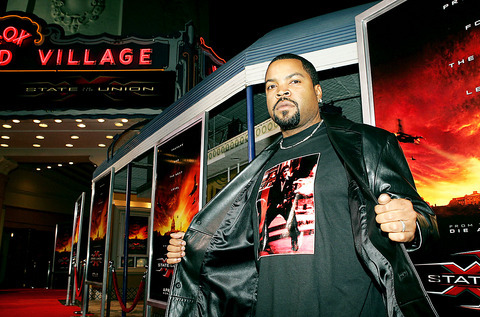Even though nobody had great expectations for XXX: State of the Union, it has managed to disappoint everyone. It's a sequel to Vin XXX without the Vin Diesel -- he chose to star in The Pacifier instead.
In the second XXX film, Agent XXX is dead, so when danger threatens the White House, XXX's boss, NSA agent Augustus Gibbons (Samuel Jackson) has to find another person to save the world. He goes back to prison -- where he got the first XXX -- and offers a former colleague (Ice Cube) a chance at freedom if he'll become the new XXX.
His mission? To stop the right-wing secretary of defense (Willem Dafoe) from usurping the centrist president (Peter Strauss) and taking over the world with his military group.

PHOTO: AFP
Ice Cube carries the movie with his attitude and angry stare, and his character goes from violent scene to violent scene, convincing everyone in his way that they will die. Besides too much mayhem, there is also too much noise, too much testosterone and far too weak a script.
Rich Cline, on British Web site "Shadows on the Wall," says this movie is around "only to exploit action movie cliches."
Unfortunately, as the action-movie antics are not wrapped together in a good plot or with well-developed characters, the "deeply corny, illogical mess," as Cline says, is not even funny.
Of course, true to the theme of excess, there are plenty of flashy things to keep you watching (and not thinking) from clip to clip: big biceps and bosoms, cars, weapons, Bond-like gadgets, crazy people, explosions, a lot of loud noises and Jackson's aura.
There is a lot of energy, and the actors seem to be having a good time, too. But even with this, the movie is not entertaining, nor is it worth one more word.

June 2 to June 8 Taiwan’s woodcutters believe that if they see even one speck of red in their cooked rice, no matter how small, an accident is going to happen. Peng Chin-tian (彭錦田) swears that this has proven to be true at every stop during his decades-long career in the logging industry. Along with mining, timber harvesting was once considered the most dangerous profession in Taiwan. Not only were mishaps common during all stages of processing, it was difficult to transport the injured to get medical treatment. Many died during the arduous journey. Peng recounts some of his accidents in

“Why does Taiwan identity decline?”a group of researchers lead by University of Nevada political scientist Austin Wang (王宏恩) asked in a recent paper. After all, it is not difficult to explain the rise in Taiwanese identity after the early 1990s. But no model predicted its decline during the 2016-2018 period, they say. After testing various alternative explanations, Wang et al argue that the fall-off in Taiwanese identity during that period is related to voter hedging based on the performance of the Democratic Progressive Party (DPP). Since the DPP is perceived as the guardian of Taiwan identity, when it performs well,

The Taiwan People’s Party (TPP) on May 18 held a rally in Taichung to mark the anniversary of President William Lai’s (賴清德) inauguration on May 20. The title of the rally could be loosely translated to “May 18 recall fraudulent goods” (518退貨ㄌㄨㄚˋ!). Unlike in English, where the terms are the same, “recall” (退貨) in this context refers to product recalls due to damaged, defective or fraudulent merchandise, not the political recalls (罷免) currently dominating the headlines. I attended the rally to determine if the impression was correct that the TPP under party Chairman Huang Kuo-Chang (黃國昌) had little of a

A short walk beneath the dense Amazon canopy, the forest abruptly opens up. Fallen logs are rotting, the trees grow sparser and the temperature rises in places sunlight hits the ground. This is what 24 years of severe drought looks like in the world’s largest rainforest. But this patch of degraded forest, about the size of a soccer field, is a scientific experiment. Launched in 2000 by Brazilian and British scientists, Esecaflor — short for “Forest Drought Study Project” in Portuguese — set out to simulate a future in which the changing climate could deplete the Amazon of rainfall. It is